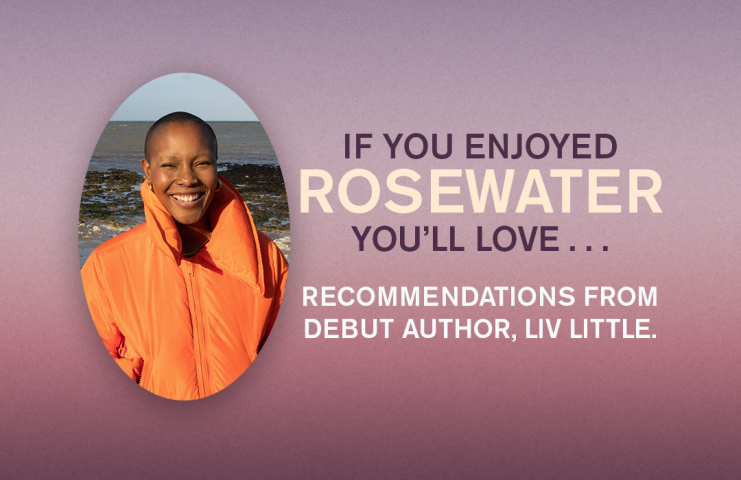Things We Lose in Waves by Lucy Ayrton: An Extract

Lucy Ayrton has an MA in Creative Writing from Warwick University, and is a novelist and performance poet. Her debut novel, One More Chance, the story of a young mother battling imprisonment and addiction, was published in 2018 with Dialogue Books and was a finalist in the Exeter Novel Award. She wrote and performed two full-length spoken word shows at the Edinburgh Festival, which were respectively turned into a poetry pamphlet and a radio play. She also competed as a national finalist at the UK Poetry Slam. Lucy currently teaches Creative Writing at Oxford University.
Discover a story of a family pushed to the breaking point, set against the backdrop of a landscape ravaged by the storms, and a town slowly falling into the sea.
CORRASION: Spring 2020
Jenny had been staring blankly out of the window of Chris’s cab. The stretches of grass, the squat grey houses, the sharp drop down to the sea. She wasn’t expecting to see this land- scape again until summer, at least. Christmas, if she was honest. She hadn’t been coming back a lot, but there wasn’t time to feel guilty about that now. There were things to do. This coastline was as familiar to her as anything else in life, and much more so than the shine and hard lines of London. She barely even registered it, eyes skating over the white dots of caravans, the looming hulk of the ruined hotel,
the brown crumble of the cliffs, until she saw the road. ‘Stop!’
It used to be a road. Now there was just a jutting of pipes and wires into air where there should be solid land. Where she was sure there used to be solid land.
He didn’t look round, but Jenny could practically hear Chris rolling his eyes.
‘What?’
And he was heading straight for it. Not checking his speed, not showing any indication that his plan was to do anything other than drive straight off the cliff.
Jenny let herself picture it – the full force of forward thrust, the moment of weightlessness, of soaring, gliding, before the fall. Smash and crush onto the beach below. It happened to the caravans, sometimes, and you never got used to the shock of seeing them down there, their insides spilled and churned by the force of the impact.
She swallowed.
‘Nothing.’
He swerved right without indicating, and they lurched down the coastal road – which, now she’d had a chance to think, she remembered was the main way into the village now – that he’d taken her down when she came home for Christmas. This road was far too close to the shoreline for comfort, but it undeniably existed.
‘You not seen a wrecked road before?’
Jenny chewed her lip beneath her face mask. Chris wasn’t wearing one, and he’d given her a proper dirty look when she’d got in the back of his cab. She’d tried to tell herself that it was just because he didn’t recognise her with the mask, but of course he did. Like it or not, they’d never not know each other.
‘It’s further back, isn’t it?’
Surely there’d been more road last time she’d lived here.
Surely it hadn’t just stopped like that. ‘It’s a metre a year.’
Jenny rolled her eyes. A level geography and being driven around by Chris Blower. It was like sixth form all over again. ‘Yeah. I know.’
‘So how long have you been away? Fifteen years, right?
Fifteen metres. It in’t rocket science.’ Jenny sighed. ‘Yeah, yeah. All right.’
There’d been a time when she would never have sighed at Chris. She simply wouldn’t have dared. For all of her teenage years, she’d lived in fear of a cutting word or a hard look from him. It seemed laughable now, but there was a time when him calling her a geek could have ruined a whole term for her.
Such a lovely idea, that that was the worst thing that could possibly happen.
He caught her eye in the rear-view mirror. ‘I aren’t about to drive you off the cliff, you know,’ he said, voice soft for once.
And the two of them looked at each other. Except they didn’t. They were both just looking at the mirror.
‘Yeah. I know,’ she said. But she wondered. ‘Cheers. Just on the left here.’
He curled his lip at her. Like she was eleven again and had committed some crime against his idea of what being cool might mean.
‘Yeah. I know.’
Jenny unbuckled her seat belt before the car had stopped moving. She had spent the twenty-minute trip frowning at her phone and not talking to him, trying hard to project the impression that it was because she had a series of important work emails to attend to, rather than that she simply didn’t want to. Chris had not felt the need to make up any kind of excuse as to why he didn’t want to talk to Jenny.
He pulled up and cut the engine dead. Flicking his eyes to her in the rear-view mirror, he said, ‘You want me to get your bags out, then?’
She’d let him put her bags in the back when he’d picked her up in Driffield. She’d packed in a hurry, back in London, and way, way too much. Clothes for all seasons, fifteen books, hair straighteners. A ridiculous amount. She’d wanted to be prepared. She wasn’t sure for what.
‘I . . . No. I’ll do it.’
He hadn’t used hand sanitiser once, in the entire trip. Which was a stupid thought, she knew. If there was any germ spreading going on, it was almost certain that she was bringing the virus up from London, not that she’d catch it here. They were saying they might shut London down, or even the whole country, even the pubs. They were saying not to travel unless it was necessary. They said a lot of things. This was necessary.
With an effort, Jenny pulled her bags out of the boot and set them down on the pavement. Her bigger bag hit the ground with an accusing thunk. Like she was going to finally read White Teeth now, when she’d owned it for ten years and not even opened the cover.
Chris craned his head out of the window. ‘What you got in there? Rocks?’
Jenny very nearly rolled her eyes. Nearly. ‘Haha. Yeah. Books.’
She was done now, with this small talk, with this endless journey, with this endless week of sad administration and frantic news refreshes when she was meant to be working. They hadn’t locked her down, and she was here. Now all she wanted was a cup of tea, made far too weak, the way she’d liked it when she was a teenager, and a spot on the sofa. Pointless would be on. A blissful end to thinking.
‘Not tins?’
Jenny reached for her smaller bag, the one with her char- gers and laptops and expensive toiletries she’d be sad to see stolen. There’d been so much space on the way up she’d put it on the seat next to her. Normally she couldn’t guarantee that even she’d get to sit down on the train, today her bag had had its pick.
‘What?’
Chris jerked his head towards her parents’ house. Her mother’s house. She had to remember. ‘Everyone knows she’s got food stockpiled,’ Chris said. His voice had a note of real anger to it, not just his usual sarky patter. He was really upset. ‘Mountains of cans. She’s well known for it. Makes sure she’s all right, does our Alison.’
‘No she doesn’t,’ Jenny said automatically. But how would she know? It might be true. She hadn’t checked the cup- boards. And she wouldn’t. Over these next few days, she’d be being kind to her mother, and helping to sort things, and minding her business.
‘Course she does. Everyone knows. Has done for years.’ He was glaring at the house, like he wanted to set it on fire. Jenny felt a throb of defensiveness and irritation, and some-
thing else. Worry. Was Chris struggling for food? Was Si? ‘Why?’ she said.
He turned his glare on her. ‘I suppose the shops never run out of anything in London. You don’t need to plan. Just get yourself a Deliveroo and get on with your life, don’t you? Everything all right there.’
She blinked. Well. Yes. That was true. ‘You run out of food? Like, often?’
She couldn’t help herself from sounding awkward as she asked it. Once, she’d asked Alex why she didn’t pay for her lunch. Chris had slammed his fist into the wall by her head and shouted at her so loud, the whole lunch room had turned around and hot tears had rolled down her face and onto the baked potato that she always paid for, her dad making sure to give her enough for lunch and a little something at break time every day. She didn’t know she was meant to ignore Alex not paying, that was all. She hadn’t meant anything by it.
This felt like that.
‘Wouldn’t expect you to understand.’
She found herself prickling. They were both grown-ups now, weren’t they? And it wasn’t like she was having an easy year. ‘Well, it’s all of us now. Empty shelves in London too.’ His face didn’t change. He’d always understood how to intimidate people, Chris, even when he was a little boy. Stillness and movement, unpredictable. Building the tension and catching you by surprise. When he spoke his voice was
hard as flint.
‘I see the news.’
But Jenny was too old for Chris’s bullshit now. She wasn’t in sixth form and she knew all the tricks.
‘Well. Cheers anyway,’ she said, making sure her voice didn’t sound as if she was remotely thankful.
She reached into her purse and pulled out a couple of twenty-pound notes, pleased with herself that she’d remembered to go to a cashpoint, that no one here accepted cards ever, as if you’d travelled back in time twenty years as well as two hundred miles north.
Chris raised an eyebrow at her and she immediately felt like she’d done something wrong. He was always like this when he was on shift. Even he couldn’t bring himself to be outright rude to a paying customer, so he got really sarky and passive aggressive instead. She’d forgotten.
It had been a blessing. It’d be good to at least get into her mum’s house before she did.
‘Thanks,’ she said, but she was talking to empty air. He’d already roared away.
She picked up the bags again and turned to her mother’s front door. It opened before she could get out her key.
Things We Lose in Waves
by Lucy Ayrton
'Brilliant' DAILY MAIL
'Moving . . . the characters are so vivid and memorable, I couldn't stop thinking of them' GOOD HOUSEKEEPING
'An elegant, assured novel about family, friendships, secrets and the push-pull of home' PRISCILLA MORRIS
Jenny's world is falling apart.
Ravenspurn is falling into the sea. The little town is perched on a remote cliff, and every day, frequent storms are claiming more land, more homes and more livelihoods.
The news of her father's sudden death forces Jenny's return to her hometown from London, but the ravaged landscape now feels like a foreign place. In a small town like Ravenspurn, the rifts between her and those she once knew are so deep they threaten to swallow her whole.
Jenny is now responsible for her late father's small pub, and its staff, Alex and Si - her former best friend and ex-boyfriend, now a couple. She's stuck living in her childhood bedroom, orbiting awkwardly around her distant mother. Her boyfriend is still in London, separated by more than just distance. Each day that Jenny remains, the town seems to shrink around her, but she knows soon the pandemic will be over. Soon, she'll be able to return to her real life.
But the secrets and the unspoken regrets that have come to haunt Jenny are not so easily escaped. In the claustrophobia of Ravenspurn, where can she turn?
A timely story of a home pushed to the breaking point; Things We Lose in Waves explores how you keep afloat when your world is falling away from underneath your feet.
'Filled with complex characters and exquisite writing' LOUISE HARE
'Emotionally rich . . . this is a beautiful, atmospheric work' ELIZABETH MCKENZIE
'A writer to watch' LAURIE PETROU







